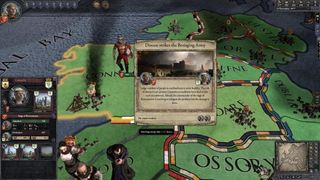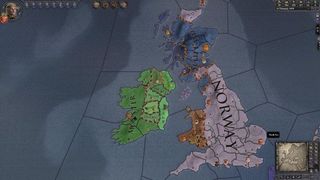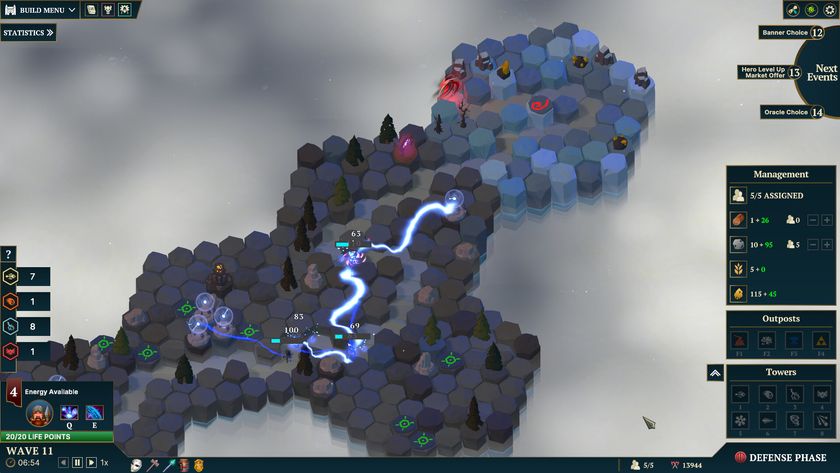
The fall of Roscommon
September 15, 1077: Duke Murchad turns 50, and a small feast in his honor is held in the siege camps, even as he refuses to give up his turn on the watch.
December 13, 1077: With the onset of winter, disease strikes the Munsterian camps and claims 40 lives.
December 22, 1077: Roscommon falls at last. After almost five months, Murchad's army has lost nearly four times as many men to chill as they did to the defenders.

February 11, 1078: Earl Áed, having been smuggled out of the city during the siege, comes to parlay with Duke Murchad and offers his formal surrender. County Connacht is declared a domain of the Duchy of Munster, and Áed is stripped of his lands and titles. Murchad elects to govern Connacht himself.
The advantage to giving counties to myself is that I don't have to worry about whether a subservient governor likes me. I'll always get the full troop levy when I call for it, and the risk of rebellion is much lower. The disadvantage is that I lose a potent gift. Few things make the lesser nobles under you happier than a landed title. Also, if my "demesne" - the counties I control directly - gets too large, my vassals and sons will start to get annoyed with me.

Once the annexation is done, Murchad names himself Duke of Munster and Connacht, giving him claim to the Duchy of Connacht in addition to the county for which it is named.
Excellent, this does two things for me. First, holding two Ducal titles is one of the prerequisites to declare myself King of Ireland. So, check that off the list. Now I just need to control 50% of its counties and pay a whole bunch of gold and piety, but that's a ways off. Second, Duke of Connacht gives me a de jure claim on County Breifne, which is historically part of the Duchy of Connacht.
The biggest gaming news, reviews and hardware deals
Keep up to date with the most important stories and the best deals, as picked by the PC Gamer team.
I'm hoping I won't even need to raise a sword to claim Breifne, though. As you might recall, my grandson Énna mac Brian is betrothed to the child countess Der-Lugdach, who is currently the rightful ruler of Breifne (under a regent, since she's about seven years old.) My hope is that, when they are wed, the people of Breifne will accept Énna as their liege lord, and he will agree to be my vassal.
And if not... yeah, then the part with the swords happens.

Now, I've received a pop-up from the game that brings a new problem to my attention (which the commenters on previous installments of this column were astute to point out). My current succession law is called "Gavelkind," which boils down to, "When you die, your lands get split up between all of your living, legitimate sons." That's going to spell disaster for any one of them becoming King of Ireland someday, creating an endless series of kinslaying succession wars among cadet branches of House ua Brian. A freaking feudal fiasco, so to speak.
I can only change one law every 10 years, but as luck would have it, it's been 10 years since the last time I did so. I change my succession law to Primogeniture: the oldest son (or daughter, if I have no living, legitimate sons) gets everything. This will make all of my other sons resent me, but hey, you can't build a kingdom without coming right out and saying that you love one of your children more than the rest of them.
But wait! This ongoing chain of unintended side-effects isn't over yet! Now that I'm using Primogeniture succession, I take a prestige penalty for all my unlanded, legitimate sons over the age of 16. I give Brian, my heir, the title Earl of Connacht accordingly. He more or less adores me for passing the new succession law, so I need not worry of rebellion or stingy levies.
Len Hafer is a freelancer and lifelong PC gamer with a specialty in strategy, RPGs, horror, and survival games. A chance encounter with Warcraft 2: Tides of Darkness changed her life forever. Today, her favorites include the grand strategy games from Paradox Interactive like Crusader Kings and Europa Universalis, and thought-provoking, story-rich RPGs like Persona 5 and Disco Elysium. She also loves history, hiking in the mountains of Colorado, and heavy metal music.











